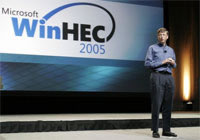 After several years of delays, Microsoft has assured computer-makers that Longhorn, the next version of Windows, is on track for release by the end of next year.
After several years of delays, Microsoft has assured computer-makers that Longhorn, the next version of Windows, is on track for release by the end of next year.
The new operating system has taken so long to appear, even Bill Gates conceded that he was impatient to see the job finished: “Whenever I see those demos, I just think, ‘Gosh (steady on Bill!), let’s get Longhorn done’” the Microsoft overlord told the Windows Hardware Engineering Conference in Seattle.
The software uber giants were at the conference to show off some of the underlying technologies and features planned for Longhorn, originally promised waaaaay back in 2003.
Ol’ Bill was on hand to demonstrate Longhorn’s new graphic interface, claiming that it offers better ways to visualise data, with users being able to see through windows that are stacked on top of each other.
His speech also enthused about Longhorn’s “more natural file organisation” offering faster searching and Microsoft’s big focus on security: “If you had to take one area where we put the most investment in, the security area would be the head of that list by a significant amount,” he said.
![]() Longhorn aims to boost security by placing cryptographic keys in special silicon chips built into PCs – a more secure solution than the current practice of storing encryption locks as data on a hard drive.
Longhorn aims to boost security by placing cryptographic keys in special silicon chips built into PCs – a more secure solution than the current practice of storing encryption locks as data on a hard drive.
This chip would render sensitive files inaccessible, even if the dastardly hacker was trying to boot the machine from a portable hard drive or floppy disk.
Not everyone has welcomed this initiative – christened the Next Generation Secure Computing Base (NGSCB) – with Microsoft cynics, critics and privacy advocates suggesting that it offers a back door for commercial interests to nefariously gain access to personal PCs.
There are also deep suspicions that the chip could be used to enforce highly restrictive DRM schemes for music, movies and software.
A less controversial new feature is Microsoft’s attempt to take on their Macromedia-guzzling rival, Adobe, with a new technology called ‘Metro’.
 This would offer a built-in method to let users view and print graphical documents, without the need to install the application that created the original file – in other words, a rival to Adobe Systems’ popular PDF technology and PostScript page description language.
This would offer a built-in method to let users view and print graphical documents, without the need to install the application that created the original file – in other words, a rival to Adobe Systems’ popular PDF technology and PostScript page description language.
“When I look at Metro, I see PDF and PostScript in the crosshairs,” ruminated Jupiter Research analyst Joe Wilcox. “Adobe is a very successful company, and PDF is an entrenched technology, but Microsoft is doing what it always is trying to do, and that is woo the developers with an alternative.”
Microsoft’s hardware conference comes just a few days before Apple releases its operating system update, Mac OS X Tiger, which offers a fast file-searching feature similar to the one promised in Longhorn.
This similarity has set the two companies at each other throats as they argue about who copied who.
At Apple’s annual meeting last week, CEO Steve Jobs hissed that Microsoft was “shamelessly” copying OS X, cattily adding, “They can’t even copy fast.”
Microsoft group Vice President Jim Allchin was having none of it, claiming that it was Apple that “became fixated on Longhorn” after Microsoft showcased some early file-searching capabilities at a conference in October 2003.
“I think they saw something that we were doing that was pretty cool,” Allchin commented, huffily adding that “There is a question of how much we should show, so that they can try to copy again.”
Longhorn’s long-delayed release in 2006 will mark a full five years since the release of Windows XP – in computer terms, that makes XP almost Neolithic.
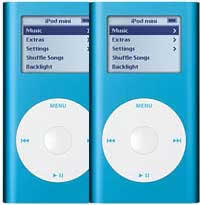 Stratospheric iPod sales send Apple executives into raptures of hugging joy, with profits almost quadrupling in a year.
Stratospheric iPod sales send Apple executives into raptures of hugging joy, with profits almost quadrupling in a year.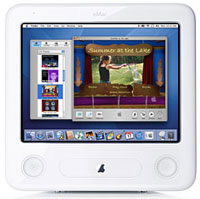 The Power Mac desktop computers were among the worst performers, with year-over-year shipments declining by 19 per cent.
The Power Mac desktop computers were among the worst performers, with year-over-year shipments declining by 19 per cent.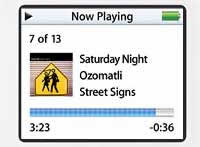 Although sales of iPods increased by 16 per cent, revenue from the product dropped by 16 per cent after Apple added the lower-cost iPod Shuffle to its range.
Although sales of iPods increased by 16 per cent, revenue from the product dropped by 16 per cent after Apple added the lower-cost iPod Shuffle to its range.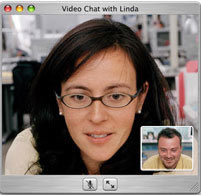 This powerful core application lets users search just about everything on their system – files, emails, contacts, images, movies, calendars and applications – with the results appearing “instantly”.
This powerful core application lets users search just about everything on their system – files, emails, contacts, images, movies, calendars and applications – with the results appearing “instantly”.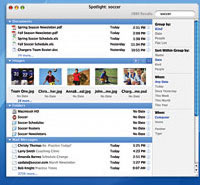 Mac OS X version 10.4 “Tiger” will be available on 29 April from 6:00 pm at Apple’s retail stores and through Apple Authorised Resellers for a suggested retail price of £89 (US$129, €129)
Mac OS X version 10.4 “Tiger” will be available on 29 April from 6:00 pm at Apple’s retail stores and through Apple Authorised Resellers for a suggested retail price of £89 (US$129, €129) Until now, Apple has been pretty safe in its position of master of all digital music players. That’s lead to speculation of their crown slipping. We’re fresh back from the European consumer show CeBIT and saw many, many good looking, highly functioned, portable music players there.
Until now, Apple has been pretty safe in its position of master of all digital music players. That’s lead to speculation of their crown slipping. We’re fresh back from the European consumer show CeBIT and saw many, many good looking, highly functioned, portable music players there.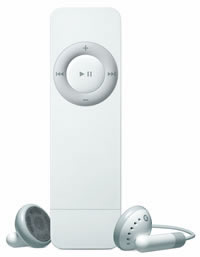 Even the most die-hard Mac hugger is having problems defending the company’s recent litigious spree, where Apple seems determined to become ‘The Man’ and use its corporate power to crush all before it.
Even the most die-hard Mac hugger is having problems defending the company’s recent litigious spree, where Apple seems determined to become ‘The Man’ and use its corporate power to crush all before it.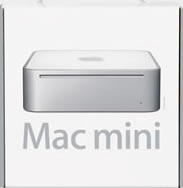 But going after the Web sites or forcing them to divulge their sources will put the company in the middle of a freedom-of-speech firestorm that will be a costly distraction for management, and could tarnish the Apple brand.”
But going after the Web sites or forcing them to divulge their sources will put the company in the middle of a freedom-of-speech firestorm that will be a costly distraction for management, and could tarnish the Apple brand.”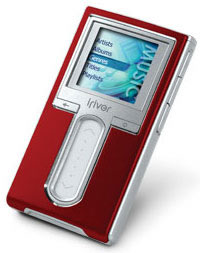 Shipments of MP3 players soared by an enormous 116% in 2004, as hundreds of wallet-tempting products arrived in response to the phenomenal success of Apple iPod player, according to a survey by Market Intelligence firm, iSuppli.
Shipments of MP3 players soared by an enormous 116% in 2004, as hundreds of wallet-tempting products arrived in response to the phenomenal success of Apple iPod player, according to a survey by Market Intelligence firm, iSuppli. The iSuppli report also predicts that HDD-based MP3 player shipments will grow by a CAGR of 41.8% from 2004 to 2009, as compared to 22.9% for flash-based players.
The iSuppli report also predicts that HDD-based MP3 player shipments will grow by a CAGR of 41.8% from 2004 to 2009, as compared to 22.9% for flash-based players.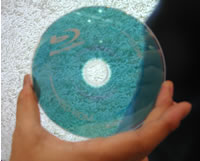 In a board meeting yesterday, Apple computers committed to join the Blu-ray Association and will occupy a seat on the main board.
In a board meeting yesterday, Apple computers committed to join the Blu-ray Association and will occupy a seat on the main board.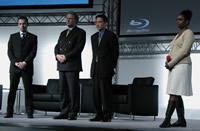 Blu-ray has been shipping in Japan now for quite some time. Sony’s BDZ-S77 (catchy name) was the first product to ship, and has been followed by other companies, some of which support the dual-layer 50Gb version.
Blu-ray has been shipping in Japan now for quite some time. Sony’s BDZ-S77 (catchy name) was the first product to ship, and has been followed by other companies, some of which support the dual-layer 50Gb version.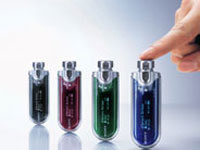 Apple Computer shares dropped Tuesday as Sony relaunched its famous Walkman line amongst concerns that increased competition from Napster might impact its dominance of online music and portable players.
Apple Computer shares dropped Tuesday as Sony relaunched its famous Walkman line amongst concerns that increased competition from Napster might impact its dominance of online music and portable players. Over the last twelve months, Apple’s share price has gone from US$23 (€17/£12) to an all-time high of US$81.99 (€61/£42) just before the split was announced.
Over the last twelve months, Apple’s share price has gone from US$23 (€17/£12) to an all-time high of US$81.99 (€61/£42) just before the split was announced.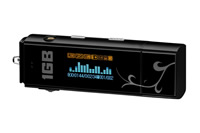 Jens of Sweden has unveiled its latest cool digital music player which they reckon will give iPod Shuffle a run for its money.
Jens of Sweden has unveiled its latest cool digital music player which they reckon will give iPod Shuffle a run for its money.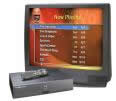 Rumours pointing at Apple as a potential bidder for TiVo have given the digital video recorder company’s shares a healthy boost – and got people wondering whether the deal would be a good fit.
Rumours pointing at Apple as a potential bidder for TiVo have given the digital video recorder company’s shares a healthy boost – and got people wondering whether the deal would be a good fit. Nearly every media and technology company is aiming at the living room now, either with Media Centre-style PCs or other digital hubs to spread content such as video and music around the home.
Nearly every media and technology company is aiming at the living room now, either with Media Centre-style PCs or other digital hubs to spread content such as video and music around the home.